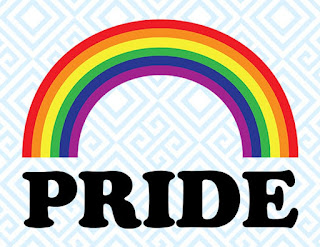Elizabeth Stephens and Annie Sprinkle
For those of you who don't know, Elizabeth Stephens is an interdisciplinary artist, activist and academic whose work explores themes of sexuality, gender, and politics.
Former prostitute and porn star Annie Sprinkle, meanwhile, played an important role in the sex positive feminist movement during the 1980s and has since built up over thirty-five years of experience in erotically charged entertainment, education, and performance art.
Today, Sprinkle and her partner Stephens are committed to queering the environmental movement and to this end have declared themselves to be
ecosexuals. They have also written an ecosex manifesto and established a new field of research and aesthetic practice called
sex ecology.
Central to their philosophy is the notion of replacing the metaphor of Earth Mother with that of Earth Lover, in the hope that this might "entice people to develop a more mutual, pleasurable, sustainable, and less destructive relationship with the environment". This means not only treating the Earth with
kindness and
respect, but also engaging in libidinal relationships with the material world; hugging trees, caressing rocks, being pleasured by waterfalls, etc.
Now, you might be thinking at this point that, as someone who has written enthusiastically on floraphilia, I would happily and unconditionally offer my support to Stephens and Sprinkle - but you'd be mistaken. Unfortunately, I have a number of problems with their project, but these might, for the sake of convenience, be boiled down to just two: firstly, I don't share their idealism and, secondly, I don't like the way they attempt to impose a unified and recognisable sexual identity upon a diverse range of paraphilias and polymorphously perverse practices.
Let's examine each of these points in a bit more detail ...
1. Like many others before them, including nature worshipping Romantics and blood and soil loving Nazis, Stephens and Sprinkle quickly fall into idealism and, related to this, anthropocentric conceit as they project their own egos (their own politics, their own prejudices, their own
peccadilloes) into everything; not just the Earth, but the Sun, the Moon and the Stars to boot. Their ecosexuality is thoroughly - and disappointingly -
allzumenschliche.
They would do well, in my view, to learn from Lawrence on this, who, with reference to the case of Thomas Hardy, warns that to try and subject the earth to your own idealism always ends badly - not least of all for you as an idealist. He writes:
"What happens when you idealize the soil, the mother-earth, and really go back to it? Then with overwhelming conviction it is borne in upon you ... that the whole scheme of things is against you. The whole massive rolling of natural fate is coming down on you like a slow glacier, to crush you to extinction. As an idealist.
Thomas Hardy's pessimism is an absolutely true finding. It is the absolutely true statement of the idealist's last realization, as he wrestles with the bitter soil of beloved mother-earth. He loves her, loves her, loves her. And she just entangles and crushes him like a slow Laocoön snake. The idealist must perish, says mother-earth. ...
You can't idealize mother-earth. You can try. You can even succeed. But succeeding, you succumb. She will have no pure idealist sons [or, in this case, daughters]. None.
If you are a child of mother-earth, you must learn to discard your ideal self ... as you discard your clothes at night."
Put simply, the Earth doesn't want to nourish you like a child nor accept you as a lover or spouse; it is massively and monstrously indifferent to your existence and your longings.
2. One of the joys of floraphilia is that it's a
paraphilia and not a legitimised form of love; the prefix
para implying not only that it exists alongside the latter, but that it's
abnormal. And that's how I like it and want it to remain. To be pollen-amorous is to allow one's desire to free float on the passing breeze; it is to become-flower, which is to say,
beautiful and soulless. It's not about constructing some new form of sexual identity and of tethering the latter to an essential truth.
Foucault, of course, brilliantly analysed the dangers and disadvantages of this with reference to the birth of the modern homosexual, arguing that homosexuality only "appeared as one of the forms of sexuality when it was transposed from the practice of sodomy onto a kind of interior androgyny, a hermaphrodism of the soul. The sodomite had been a temporary aberration; the homosexual was now a species" subject to an entirely new discursive regime.
I'm sure Stephens and Sprinkle are aware of all this and so it surprises me to say the least that they insist on positing ecosexuality as a
primary drive and identity, or some sort of ontological category into which all other sexual positionings - GLBTQI
- can ultimately be collapsed
(because we are all natural beings and
all sex is ecosex).
I wish them well, but I also wish they'd exercise a little more philosophical caution and nuance ...
Notes
D. H. Lawrence, 'Dana's "Two Years before the Mast"', Studies in Classic American Literature, ed. Ezra Greenspan, Lindeth Vasey and John Worthen, (Cambridge University Press, 2003).
Michel Foucault, The History of Sexuality 1: The Will to Knowledge, trans. Robert Hurley, (Penguin Books, 1998).
Readers interested in knowing more about the work of Beth Stephens and Annie Sprinkle and reading their ecosex manifesto can visit: sexecology.org






